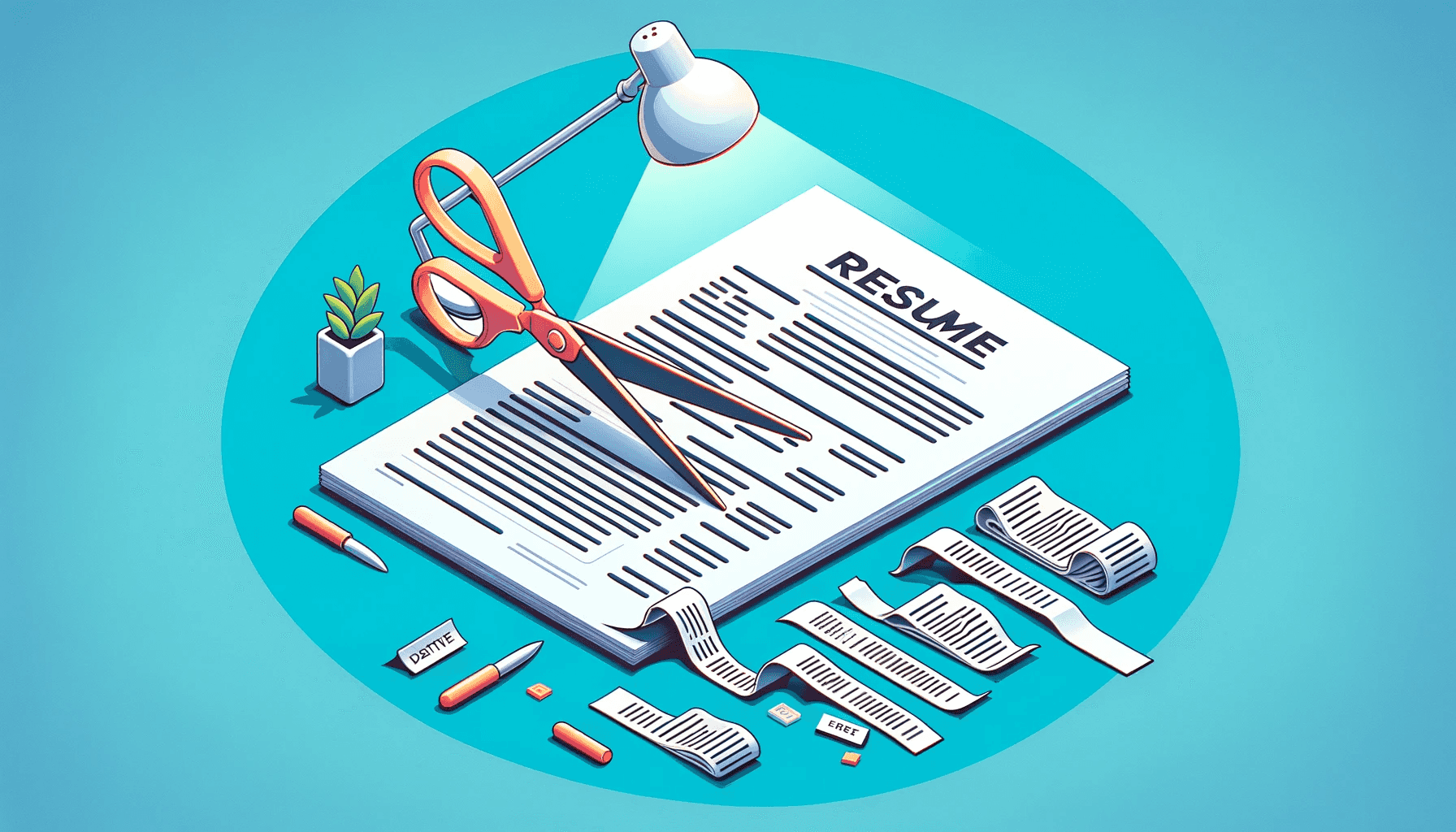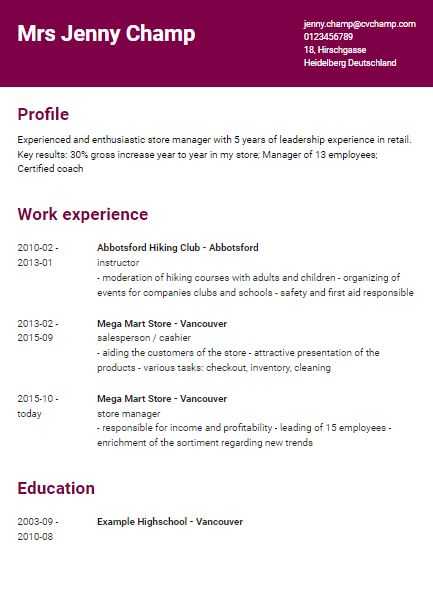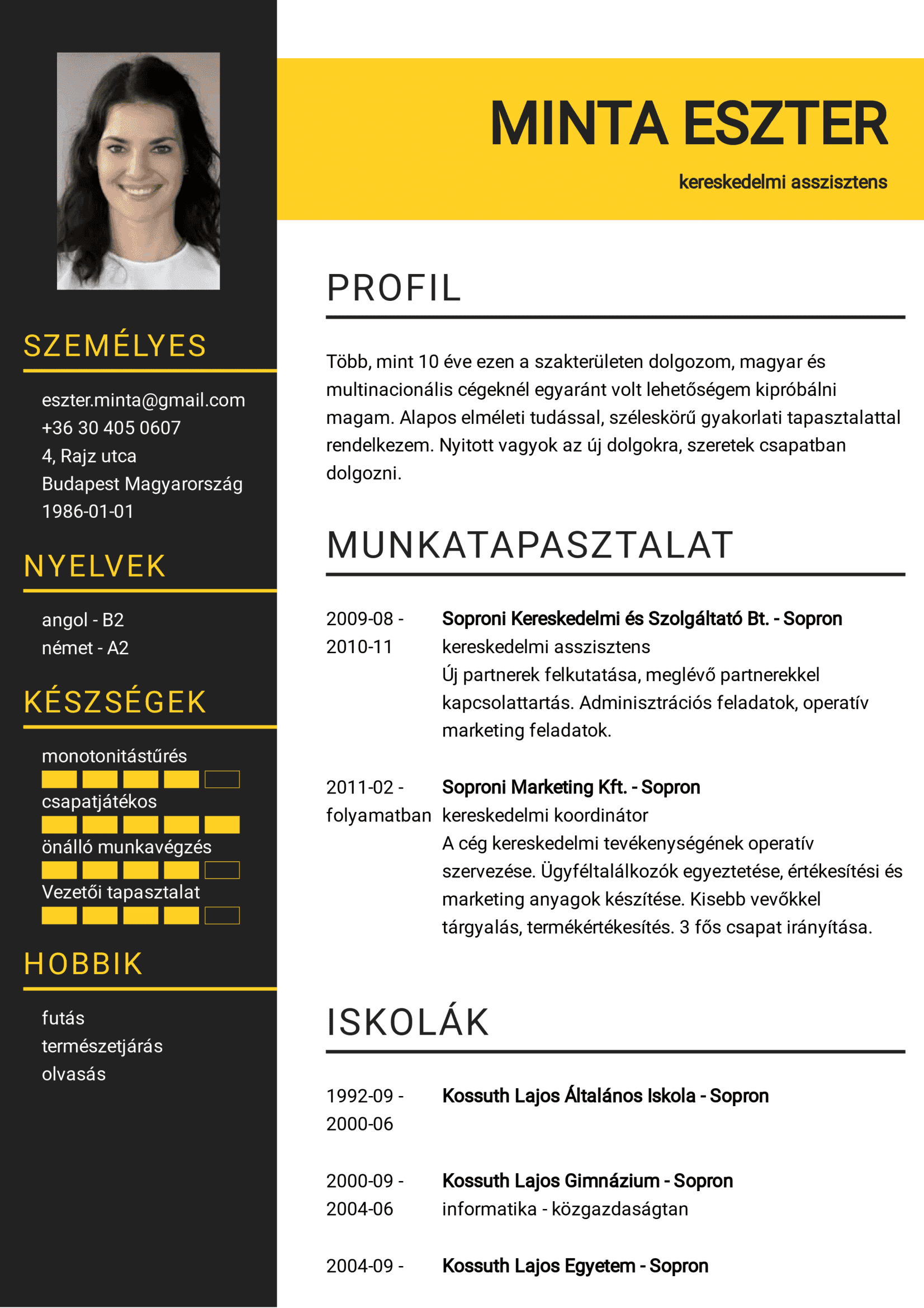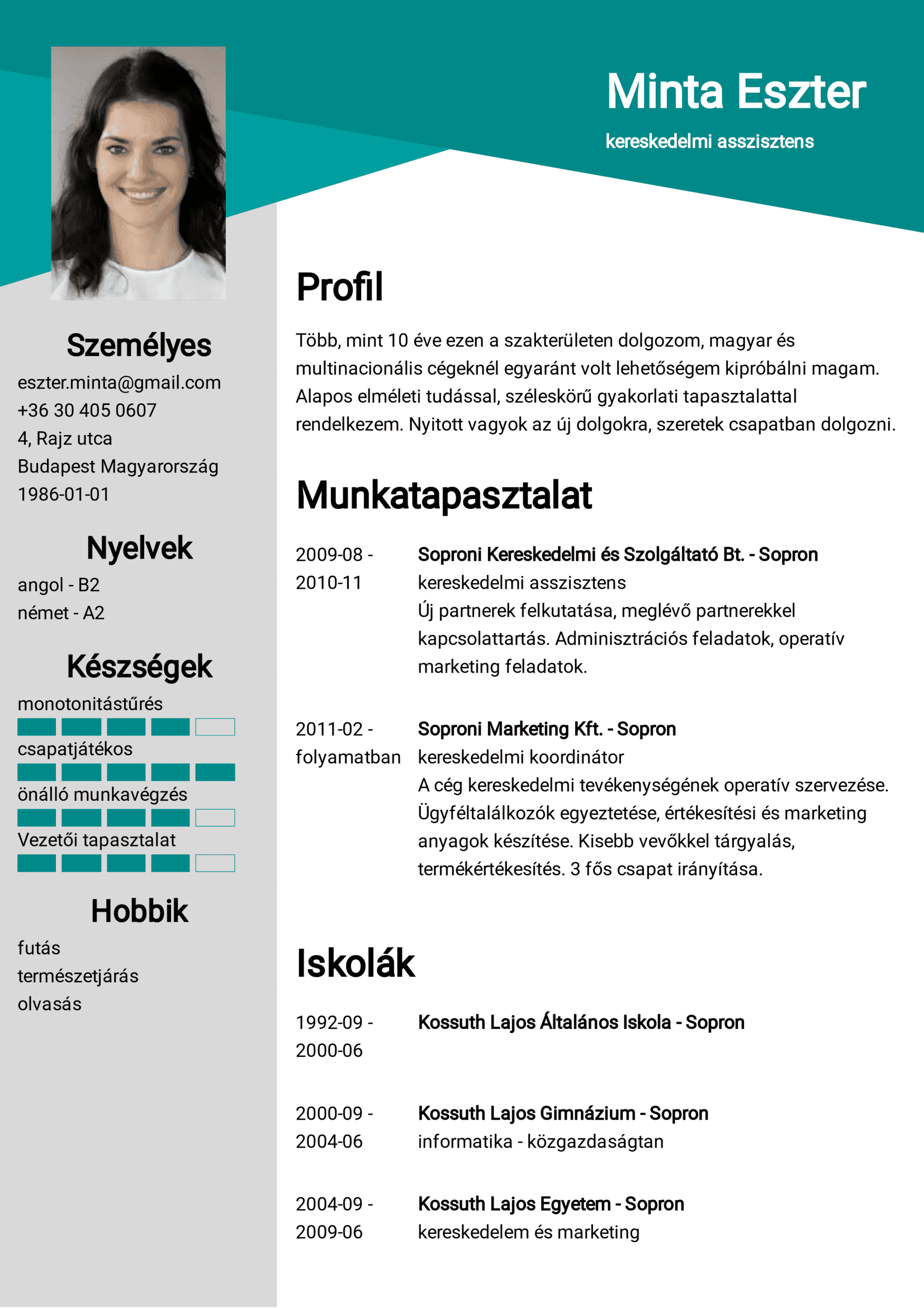

Introduction in the CV - what should I write about myself?
The introduction at the beginning of the CV is a short summary of who we are, what our key strengths are and what we aim to achieve. A good personal profile grabs the reader's attention and makes us stand out from the crowd. As it is placed at the beginning of the CV, it also plays an important role in creating a first impression.
Many people think that a CV is just a list of schools and previous jobs. But a successful CV is much more than that. If you think of it as a marketing piece or an advertisement, where you present yourself and try to convince the employer of the things you should choose, you will be closer to the truth.
What is the personal profile?
The introduction or personal profile is a short text at the beginning of your CV where you have the opportunity to write an introduction about yourself, highlight your motivation and the most important qualities you have to offer for the job you are applying for.
What is the importance of the personal profile in the CV?
The purpose of the introduction is to attract the reader's attention by providing the most important information at the beginning of the CV in a short, clear and concise manner. You should write a few lines about yourself in such a way as to make them read your CV further.

Imagine yourself in the shoes of the person whose job it is to select the best few CVs out of the 50, 100 or more that are received for a given job advertisement. It is quite obvious and common that not all the CVs are read, not all the information is read, not all the information is read, not all the information is thought through. They start by skimming through the CVs, looking for signs that should definitely exclude a candidate. By writing a good profile at the beginning of your CV, you increase your own chances of having your CV read thoroughly after the first screening.
From the above, it is easy to see the point of the introduction: we need to briefly show why we are suitable for the advertised job.
Advice on writing your personal profile
We've put together the most important tips and considerations that can help you write the best possible introduction.
How long should the personal profile be?
In general, the personal profile of a CV should be no more than one paragraph and no more than 3 sentences long. You can also write a bulleted list, but it should not be longer than a few bullet points. The more you write in this section, the higher the chance that recruiters will not read through it or will only skim it.
Focus on the most important information!
As the length of the personal profile is very limited, we cannot write too much information here. We need to be able to select the few things we want to mention in this section. We should try to highlight the qualities or previous experiences that make us unique and stand out from the other applicants.
Too many things to mention and you can't choose? Think about which of the characteristics you have picked out might be more important for the position and try to choose the ones that have the greatest impact.
Are you a career starter with no work experience and don't know what to write here? Highlight the qualities that are important for the job. Can you show a competitive record, extracurricular activities, hobbies that can help support these qualities? Write them in! For example: „I have been swimming competitively since I was 7, my strengths include tolerance for monotony and I can cope with challenges under stress.” Or: „In addition to my university studies, I have volunteered twice a year. Empathy, understanding others' problems and helping others are among my strengths.”
Using keywords
Take a look at the job advertisement and think about what tasks might be involved in this position, what might be the biggest challenges? What are the skills that you can't compete without? What expectations has the employer set out in the advertisement? Which ones seemed to be key?
If you have identified some keywords, try to include them in the introduction. There are two practical reasons for this: if the recruiter is just skimming through CVs, these are the keywords that the recruiter's eye is looking for. If your profile includes these keywords, your chances are definitely better. On the other hand, larger companies use automated systems to process CVs, which help them to pre-screen a large number of applications. These systems also monitor the occurrence of keywords.
Tailor to the specific job!
If you don't want your presentation to be a collection of generalities and overused phrases, you should take the time to tailor this section to each job you apply for.
If you are applying for jobs with a different profile, you will need to use different keywords and different information will be important to the employer. Try to write a personalised summary of yourself so that your profile can best answer these.
For the reader, a text full of too general terms will give the impression that you haven't paid much attention to your CV, whereas a specific, targeted introduction with the most important keywords of the job can work wonders. Let's look at two examples to illustrate this, and if you have any doubts left, they will surely be dispelled!
Too general: "I am looking for new challenges where I can show my skills and experience. I like learning new things and I am flexible in any situation. I am very motivated, I am a team player, but I also like to work alone. "
A good example: "For the past 5 years, I have successfully led a marketing team of 10 people and designed the online marketing strategy for the company's latest product. My professional goal is to find a company where I can meet similar challenges and opportunities for growth. "
Don't repeat yourself!
The purpose of an introduction is not to describe in complete sentences everything that is on your CV. Again, it is worth thinking of your CV as an advertisement. In the profile, we should write the opening of the advertisement, a punchy and attention-grabbing introduction, the first thoughts that make the reader want to read the whole document. We write what makes us stand out from the crowd or is key to filling the position.

Be honest!
Paper can take anything, but it is extremely important that you write your introduction and your CV honestly! It may seem a good idea to change dates here and there so that it doesn't look like you've been unemployed for a year, but believe me, if this comes to light it will have disastrous consequences for your application. It's not a good idea to write in qualities and skills you don't have, as you may be asked about them at the interview, which could lead to a really awkward explanation. And even if you somehow manage to get past these, the question of whether these things will come to light in the course of day-to-day work will still be hanging over your head. The company can also say goodbye to you at any time during your probationary period if you don't deliver, so I think there is little point in painting an untrue picture of yourself on your CV.
Honesty is much more important. If you can talk about how you were unemployed, but how you took opportunities to develop yourself, you can show more about yourself and your good attitude. Likewise, if you admit in the interview that you are not yet so skilled in database management, but they see in you the ambition and the need to improve, this will be taken positively.
Word it well!
Don't write complicated circular sentences. No one will spend a lot of time trying to get the gist of your brilliantly structured five-line sentence. Instead, break it down into several, easy-to-understand ideas. You don't have to think in sentences only, but don't make it difficult for those who will read your CV. Don't use too many foreign words and complicated expressions. It's important to show your professional competence, but if you want to make yourself look better, this will soon become clear during the interview process. Of course, don't overdo it either: slang, jargon, pithy, ambiguous language will all have a negative effect, so it's best to avoid them. Instead, be honest, be clear and concise, and avoid exaggeration.
Of course, you must also make sure that what you write is correct. No typos, no spelling mistakes, pay attention to the structure of your sentences. As far as possible, try to create a smooth text without repetitions. It's a shame to spoil good content with typos and spelling mistakes, and well-constructed interest will soon be lost on the employer if they see that your CV is full of mistakes. Some practical advice to this idea:
-
Use a text editor to check spelling: Many text editors have a spell-check function. You don't always have to blindly trust it, but it will help you spot obvious mistakes if you've overlooked them.
-
Ask your friends: Read it with family and friends. The uninitiated eye will always spot mistakes sooner than someone who has spent a lot of time putting sentences together.
-
Use a CV generator: If your CV generator includes such a feature, use it so you can write a flawless CV with minimal effort.
Take care of the appearance!
In general, when writing a CV, it is important to produce a document that is consistent in format and style. Make sure you use a consistent font, font size and paragraphing. Try to arrange the introductory text so that it does not take up too much space on the first page, but use a large enough font size so that it is not difficult to read.
If you want to create a truly professional CV, you should also make sure that both the content and the layout of the CV match the job you are applying for. In areas where a more conservative approach is typical, a CV with a focus on content and a minimalist look or one that promotes clarity and readability will stand out better. In contrast, for creative professions, it may be more relevant to apply with a CV in a unique format and text style. In this case, you can give more freedom to your imagination, but you should also keep in mind that the final result should be a coherent document, stylish but with sufficient information.
You can use a CV template or a CV generator to help you concentrate on the content, because you can take the weight of the look and formatting off your shoulders, and you will end up with a well-formatted CV.
Take your time!
We have left the most important advice to the end. As we have seen so far, the personal introduction is an extremely important part of a CV, and perhaps the most difficult to write. Even though it is only a few lines, there are many aspects to consider when writing it, and it needs to be well thought out, precise and concise. No one does this from one minute to the next, so it is worth taking the time to do it. You can write several versions, and then use them to put together the best ideas. Don't be afraid to rethink, rewrite, try again and again until you get the result you want. Ask your friends and family for advice. To be successful in your application, you will definitely need a good introduction.
Most common mistakes in the personal profile
We have collected the most common mistakes that applicants make when writing their application. It's worth being aware of these and reading your own CV to make sure you haven't made the same ones. Under each mistake we have included illustrative examples and examples of how to correct the problems.
Inappropriate length
We should try to stick to the length of a few sentences. In many cases, it is not advisable to give a shorter introduction than this because we cannot give enough information. And it is not worth writing too long because the reader will lose interest or, worse, will not even bother to read your CV.

Too short introduction: "I am a good team player, accurate and fast worker with one year of experience as a shop assistant. My goal is to develop in this field "
Too long introduction: "I have one year of experience as a shop assistant. I worked at Some-Shop Ltd. as a cashier at a shop in a small town. In addition to my cashier duties, I regularly assisted in restocking and also substituted at the deli counter on several occasions. It is very important for me to be always precise in my work, in one year I was able to keep the cash deficit under 100€ due to my carelessness, which I think is adequate. I am a quick learner and my colleagues have also given me a good review. I would like to try my hand in a position where I can build on my previous experience, possibly move up in the future based on my good performance, and try my luck in a store manager position."
Adequate profile length: "I have one year of experience as a shop assistant in a municipal shop. I am a precise worker, my greatest achievement is that I have done my job with minimal cash shortage. My goal is to use my experience to seek new challenges in a higher prestige retail unit.*
Too general
Let's not be clichéd. Avoid using terms that are overused and that everyone mentions when they write about themselves in their CV. We should choose phrases that help our CV stand out from the rest. On the other hand, it is also best to have some kind of answer to the main expectations of the job you are applying for, so it is also important to always write a CV that is tailored to the position.
Too general profile: "I am a proactive worker with good communication skills. I like challenges and variety, but I can also do monotonous work with ease. I enjoy dealing with people, I find common voice with others easily. I try to find the right solutions in every situation and do my best under all circumstances".
Good profile: "I have 4 years of project management experience in a German company. I manage resources well, all my projects have been completed on time. I am good at prioritizing, managing parallel projects in an optimal way. My goal is to learn about the American business management style, specifically the challenges in project management."
Poorly formulated
As you may have read in the advice section: don't be too complicated or difficult to understand, but don't be too fussy or too simple either. Try to express your thoughts in a smooth style, without spelling mistakes. Once again, if you have the opportunity, have a friend read your CV! If they don't understand what you wrote about yourself at first glance, it's probably worth rewording your sentences.
Too complicated wording: "I worked as a Legal and Procurement Assistant in the Logistics and Procurement Department of BigCorp Ltd., my main responsibilities included commenting on deadlines for internal commitments in relation to procurement requirements, and developing and commenting on internal procedures for legal commitments with the relevant departments and ensuring legal compliance in the same respect "
Adequately defined profile: *"As a legal and procurement assistant, I was involved in the development of internal procedures. I was responsible for ensuring legal compliance and coordinating the interdepartmental review of the procedures and for commenting on the deadlines set.















